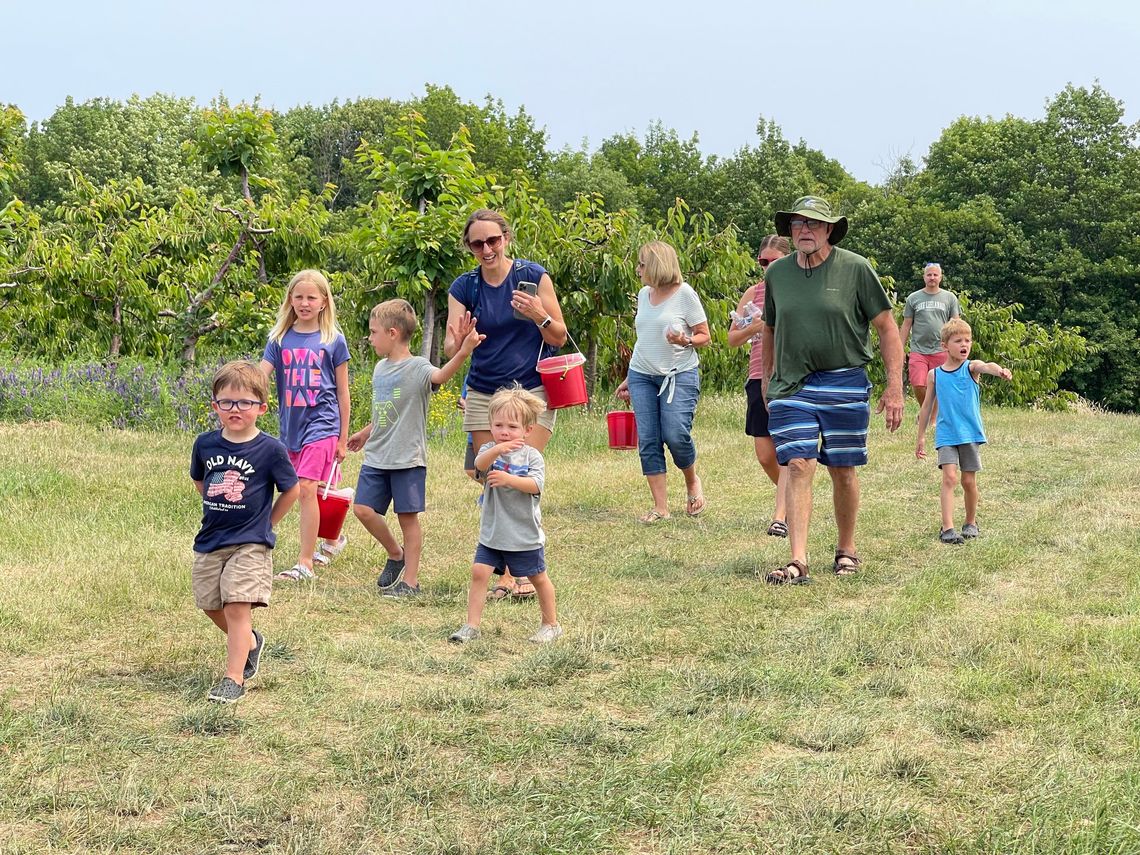Leelanau Township Planning Commission members will move forward with considering a change to a zoning ordinance text amendment to provide for farmstays in the Agricultural Zoning District.
Phil Hallstedt of Hallstedt Homestead Cherries in Northport first introduced the application to board members at the April 25 township planning commission meeting. Hallstedt’s application/proposal is a text amendment that would provide working farms with 40 or more acres to have the option to host up to four farm stays (campsites) under a special use permit, with a goal to ultimately help farmers generate additional on-farm income. The special use permit could be rescinded if deemed necessary.
“So we can define farmstay camping or lodging pretty easily and not have to define agritourism at this point…” said Leelanau Township Zoning Administrator Steve Patmore at the meeting. “So that’s my recommendation to go forward. I do think that if you want to have more discussion about the size of the parcel and who can do this, that would be appropriate.”
In a presentation during a planning commission public hearing on May 23, Hallstedt talked about the need to diversify on-farm income, citing that cherry family farms face a lack of consistent financial income throughout the year and how the majority have jobs off the farm to survive, among other issues. Hallstedt said the text amendment incorporates feedback from the last few years since first engaging with the planning commission about the idea in the fall of 2020.
It also utilizes language largely taken from the Cleveland Township Agricultural Tourism amendment passed in 2022 which specifies allowing up to four farmstays per parcel in their agricultural district. Some of the goals of the provisions are to maintain and promote agriculture and related activities, to preserve open space and farmland, and to maintain the township’s agricultural heritage and rural character.
The proposed ordinance defines the terms agritourism, working farm, and farmstay. Agritourism is defined as “the practice of visiting an agricultural operation for the purposes of purchase, recreation, education, and/or active involvement in the operation; not as a contractor or employee of the operation.” Whereas, a farmstay is defined as “a building or place that provides temporary or short-term accommodation to paying guests on a working farm as a secondary business to primary production.”
The amendment addresses a number of concerns about parties, noise, traffic, smoke, and the excessive number of farmstay operations. Along with abiding by Michigan EGLE health regulations, the farmer or their orchard manager must be living on the property to monitor parties so they can respond to any disruptive behavior. No amplified music is allowed, with setbacks from the property line being 80 feet, which is double the 40 feet required for a permanent residence.
A requirement for a maximum of eight adults spread out on 40 plus acres is noted to maintain the rural character in Leelanau Township’s long range plan, and only smokeless designed containers are allowed. In addition, there would be restrictions requiring the 40 plus acre farms to be actively working in agricultural products with over 50% of their tillable land in production.
The amendment would honor the township’s master plan concerning agriculture, Hallstedt continued. One of those master plan goals, “to encourage the retention of prime agricultural lands within the township in recognition of the agricultural industry’s direct impact on the region’s economy and quality of life,” would be met through the ordinance. Large agricultural lands and forested areas would be preserved, and would provide supplementary income for farmers through agritourism activities consistent with community character. The amendment would also consider proposals for lodging.
A number of local farmers from the area wrote letters of support, of which were noted during the public hearing, for Hallstedt’s request to allow farm stays on agricultural zoned working farms. Jim Bardenhagen of Bardenhagen Farms, another prominent farmer in the county, voiced his support in a letter for the proposal and giving farms interested in agritourism an opportunity to increase their farm income through these efforts.
“Agritoursim is definitely a way for some farms to generate additional revenue and the restrictions in the farm stay proposal will hopefully satisfy any public/neighbor concerns,” Bardenhagen wrote.
Farm owners Rick and Nancy Deering highlighted in their letter that in the past five plus years or more, prices on trying to keep cherry farms going has “increased tremendously,” and the prices they get for their fruit has not increased enough to keep farming.
“We need to generate income from other options to be able to keep farming in the future. Both of us had to work other jobs to be able to keep the farms, so far…” the Deering’s wrote. “We (our family) are very sentimental about our farm we call the ‘old farm,’ it’s been owned by our great-grandparents, then our parents, and then us, and our children will someday take it over. My husband’s mother was born and raised on the ‘old farm.’ We want to keep it in the family, but we need to have another source of income to pay the taxes on it… If we can’t diversify our income by this idea, then we might have to consider selling our farms.”
Following the planning commission meeting, the zoning administrator will work with a professional planner to reconcile the proposed text amendment with the zoning ordinance. The new document will be presented to the applicant and planning commission no later than June 20 for discussion at the June 27 planning commission meeting.








